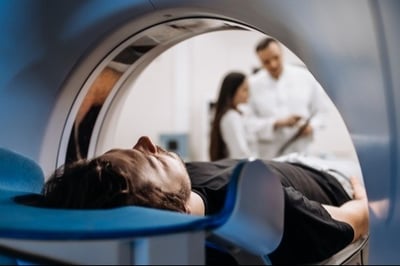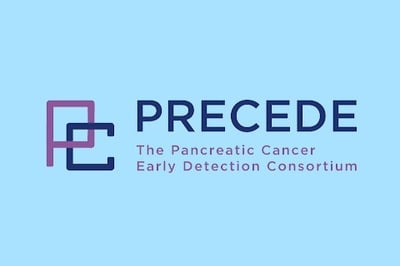Search Results: Prevention, Detection & Risk + Pancreatic Cancer (6 results)
New Search
Prevention
Phase 1 pancreatic cancer prevention study for people at high risk
Vaccine for People at High Risk for Pancreatic Cancer
This study is testing an experimental vaccine that helps the immune system recognize changes in a protein called KRAS, which is commonly involved in pancreatic cancer. The vaccine is given with an immune-boosting medicine that helps improve the body’s response.

Prevention
Pancreatic cancer screening study for people with ATM, BRCA1, BRCA2 or PALB2 mutations
Pancreatic Cancer Screening Study for People with ATM, BRCA1, BRCA2 or PALB2 Mutations
This study will look at how often routine MRI scans detect abnormal findings in people with inherited mutations in BRCA1, BRCA2, ATM, and PALB2, who are undergoing pancreatic cancer screening. Researchers want to learn how often MRI and endoscopic ultrasound (EUS) yield abnormal results, and how frequently they find pancreatic cancer or precancer. The study will also review the rate of procedures like biopsies and surgeries among participants.

Prevention
Screening study for people at high risk for pancreatic cancer
Pancreatic Cancer Screening Study (CAPS5)
CAPS5 is a study looking at screening for early cancer in people with an elevated lifetime risk of developing pancreatic cancer. The goal is to study biomarkers derived from images and tissue samples (blood, pancreas fluid, duodenal fluid) for the early detection of pancreatic cancer and precancerous lesions.

Prevention
Registry and biobank for high risk people undergoing pancreatic cancer screening
Pancreatic Cancer Early Detection for People at High Risk
The study will collect clinical information, family history, and samples (blood, saliva or cheek swab) from people and families at risk for pancreatic cancer. Collecting this information and samples will create a resource to drive research necessary for early detection and prevention of pancreatic ductal adenocarcinoma (PDAC).

Prevention
Observational study for people with family history of pancreas cancer or an inherited mutation linked to pancreatic cancer risk
Blood Markers of Early Pancreas Cancer
The purpose of this study is to try to find markers of early pancreatic cancer for individuals at higher-than-average risk, expedite the diagnosis in individuals with symptoms, and substantially improve an individual's chance of surviving the disease.

Prevention
Screening study to detect pancreatic cancer and precancer
A Pancreatic Cancer Screening Study for High Risk Individuals
The purpose of this study is to screen and detect pancreatic cancer and precancer in people with either a strong family history of pancreatic cancer, or an inherited mutation associated with pancreatic cancer risk.
Magnetic Resonance Imaging (MRI) will be used to screen for early stage pancreatic cancer. Participants will also be asked to donate a blood sample at specific intervals for the creation of a blood bank necessary for the development of a blood-based screening test for pancreatic cancer.
